1. Overview
Yoshimasa Hayashi (林 芳正Hayashi YoshimasaJapanese, born 19 January 1961) is a prominent Japanese politician serving as Chief Cabinet Secretary since December 2023. A long-standing member of the Liberal Democratic Party (LDP), he has held significant cabinet positions, including Minister for Foreign Affairs (2021-2023), Minister of Education, Culture, Sports, Science and Technology (2017-2018), and Minister of Agriculture, Forestry and Fisheries (2012-2014, 2015). Hayashi initially served five terms in the House of Councillors from 1995 to 2021, before transitioning to the House of Representatives in 2021, representing the Yamaguchi 3rd district.
Coming from a distinguished political family, Hayashi is the fourth generation of politicians in his lineage. His political career has been characterized by a focus on administrative and tax reform in its early stages. Affiliated with the Kōchikai faction, which traditionally emphasizes economic prosperity, liberal values, and international cooperation while opposing nationalism, Hayashi's policies and stances reflect a moderate conservative approach. His tenure as Minister of Agriculture, Forestry and Fisheries saw a notable increase in Japanese food exports, driven by the "FBI" strategy. As Foreign Minister, he engaged in active diplomacy, including attending NATO meetings and strengthening ties with key international partners, though his diplomatic style and remarks have occasionally drawn criticism. His current role as Chief Cabinet Secretary places him at the center of government administration, where he continues to influence Japan's domestic and foreign policy.
2. Early life and education
2.1. Birth and background
Yoshimasa Hayashi was born on 19 January 1961, in Tokyo, Japan, to Yoshiro and Yoneko Hayashi. His father, Yoshiro Hayashi, was a senior bureaucrat at the Ministry of Economy, Trade and Industry (then the Ministry of International Trade and Industry) and later became a prominent politician, serving as Minister of Finance. In 1969, when his father ran in the 32nd General Election for the Yamaguchi 1st district, the family relocated to their ancestral home in Shimonoseki, Yamaguchi Prefecture. Hayashi attended Shimonoseki Municipal Bunkan Elementary School and Shimonoseki Municipal Nisshin Junior High School.
2.2. Education
Hayashi graduated from Yamaguchi Prefectural Shimonoseki-Nishi High School in 1979. He then matriculated at the University of Tokyo, where he chose to specialize in public law within the Faculty of Law, graduating in 1984. During his university years, he was an active member of both the university choir and a rock band. Later, he pursued postgraduate studies in the United States, enrolling at the Harvard Kennedy School in April 1991 as a special research student and formally entering in September 1992. He completed his Master in Public Administration (MPA) in June 1994. His wife, Yuko Hayashi, also pursued a master's degree in technology policy at the Massachusetts Institute of Technology (MIT) during their time in the United States, both universities being located in Cambridge, Massachusetts.
3. Early career
3.1. Mitsui & Co. and U.S. political experience
After graduating from the University of Tokyo in 1984, Hayashi initially had no intention of following his father into politics. Instead, he joined Mitsui & Co., a major Japanese trading company, a path less common for someone of his political and educational background compared to a career in government ministries. At Mitsui, he was assigned to the tobacco department. A brief posting to Nicaragua to renew tobacco contracts exposed him to the effects of the ongoing civil war, which led him to realize the importance of stable government. He also had several other overseas postings, including one in North Carolina, United States, a significant source of tobacco for Mitsui at the time.
While studying in the United States, Hayashi gained valuable experience in the American political system. From September 1991, he worked as a staffer for U.S. Representative Stephen L. Neal on the House Banking Committee. In November 1991, he transitioned to serve as an international affairs assistant for U.S. Senator William V. Roth, Jr.. During his time with Senator Roth, he played a role in initiating the Mansfield Fellowship Program, which fosters understanding and exchange between U.S. and Japanese policymakers.
3.2. Entry into politics
Hayashi decided to pursue a political career and resigned from Mitsui & Co. in 1989. He then joined Sanden Kotsu, a family-owned bus company, serving as the president's secretary, and later worked for Yamaguchi Godo Gas. In December 1992, he suspended his graduate studies at Harvard and returned to Japan when his father, Yoshiro Hayashi, was appointed Minister of Finance in the reshuffled Miyazawa Cabinet. Yoshimasa served as his father's ministerial secretary. In 1993, he passed the qualification examination for Diet member policy secretaries. In August 1994, after completing his studies at Harvard, he became his father's policy secretary, formally marking his entry into the political sphere.
4. Political career
Yoshimasa Hayashi's political career began with his election to the House of Councillors in 1995, followed by multiple cabinet appointments and a transition to the House of Representatives.
4.1. Member of the House of Councillors
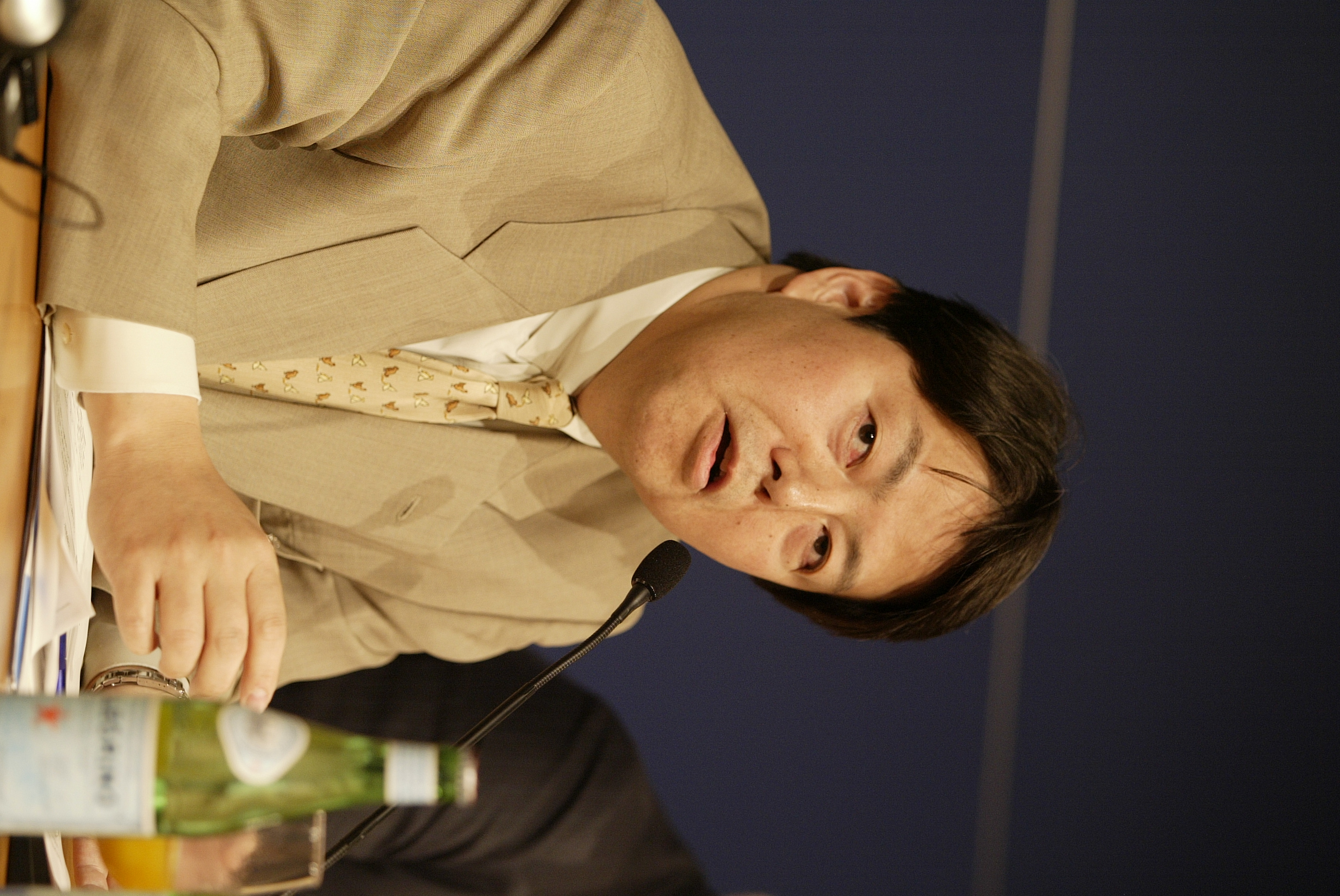
Hayashi was first elected to the House of Councillors for the Yamaguchi at-large district in July 1995, in the 17th House of Councillors election, defeating incumbent Kenichi Yamada. This marked him as the fourth generation of politicians in his family. He was subsequently re-elected four more times in 2001, 2007, 2013, and 2019, serving a total of five terms until 2021. In the early years of his political career, he focused on administrative and tax reform.
He joined the Kōchikai faction within the Liberal Democratic Party, a faction known for its moderate conservative views, emphasizing economic prosperity, liberal values, and international cooperation, while generally opposing reliance on nationalism as an ideology. Both his father and former Prime Minister Kiichi Miyazawa were also members of this faction. In October 1999, he was appointed Parliamentary Vice Minister of Finance in the Obuchi Cabinet, serving under Miyazawa, who was then the Minister of Finance. In this role, he was primarily responsible for responding to questions in the House of Councillors. He later served as Chair of the House of Councillors Foreign Affairs and Defense Committee from October 2004 to 2005. In 2006, he was appointed State Minister of Cabinet Office in the First Abe Cabinet. From 2009, following the LDP's loss of power, he served as Shadow Minister of Finance under LDP President Sadakazu Tanigaki. He also held positions within the LDP, including Acting Policy Research Council Chairman and Chairman of the House of Councillors Policy Deliberation Council. In 2010, he was promoted to Vice Chairman of the House of Councillors for the LDP.
4.2. Cabinet appointments
Hayashi has served in various ministerial positions throughout his career, demonstrating his versatility across different policy areas.
4.2.1. Minister of Defense
Hayashi was appointed Minister of Defense on 1 August 2008, as part of a reshuffle of the Yasuo Fukuda Cabinet. This marked his first cabinet appointment. However, his tenure was brief, lasting just over a month, as Prime Minister Fukuda resigned on 24 September 2008. Hayashi was succeeded by Yasukazu Hamada when the Aso Cabinet was formed.
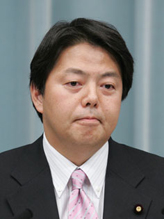
4.2.2. Minister of State for Economic and Fiscal Policy
In July 2009, Hayashi was appointed Minister of State for Economic and Fiscal Policy in the Aso Cabinet. This appointment was part of a reshuffle to alleviate the concurrent responsibilities of Kaoru Yosano, who had been serving as Minister of Finance, Minister of State for Financial Services, and Minister of State for Economic and Fiscal Policy following the resignation of Shoichi Nakagawa. Hayashi's term in this role was also short, lasting approximately two months, as the Aso Cabinet resigned in September 2009 after the LDP's significant defeat in the 2009 general election.
4.2.3. Minister of Agriculture, Forestry and Fisheries
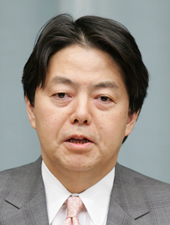
Following the LDP's return to power in the December 2012 general election, Hayashi was appointed Minister of Agriculture, Forestry and Fisheries in the Second Abe Cabinet on 26 December 2012. He held this position until 3 September 2014, when the Third Abe Cabinet was formed. He returned to the ministry for a second term, serving again as Minister of Agriculture, Forestry and Fisheries from 23 February 2015, to 7 October 2015, after his successor, Koya Nishikawa, resigned due to a scandal.
During his terms, with Japan's domestic agricultural market shrinking, many of his policies focused on making the industry more export-oriented. He actively promoted the 'FBI' strategy, which aimed to promote authentic Japanese cuisine overseas, foster food businesses by Japanese companies abroad, and increase the export of foods made in Japan. As a result of these efforts, Japan's food exports, which had remained stagnant at around 450.00 B JPY annually until 2012, significantly increased to 745.00 B JPY by 2015.
4.2.4. Minister of Education, Culture, Sports, Science and Technology
Hayashi was appointed Minister of Education, Culture, Sports, Science and Technology on 3 August 2017, as part of a reshuffle of the Third Abe Cabinet. This marked his fifth cabinet appointment, an unusual feat for a member of the House of Councillors. He retained this position when the Fourth Abe Cabinet was formed in November of the same year. During his tenure, in March 2018, he oversaw the revision of the High School Curriculum Guidelines. He served in this role until the cabinet reshuffle in October 2018.
4.2.5. Minister for Foreign Affairs

In November 2021, Hayashi was appointed Minister for Foreign Affairs in the Second Kishida Cabinet. Upon his appointment, he stated his intention to resign as chairman of the Japan-China Friendship Parliamentarians' Union to avoid unnecessary misunderstandings in his official duties.
Hayashi was the first Japanese foreign minister to attend a NATO foreign ministers meeting in Brussels in April 2022, highlighting Japan's increasing engagement with the alliance amidst evolving global security dynamics. In April 2022, he inspected the USS Abraham Lincoln, a US Navy nuclear-powered aircraft carrier, accompanied by US Ambassador to Japan Rahm Emanuel, flying from Atsugi Base to the carrier on an MV-22.
In July 2022, he held a Japan-Korea foreign ministers' meeting with South Korean Foreign Minister Park Jin, who visited Japan to offer condolences for former Prime Minister Shinzo Abe. They agreed on the early resolution of the forced labor issue and on accelerating discussions on pending issues between the two countries. In August, he visited Phnom Penh, Cambodia, to attend the ASEAN-related foreign ministers' meetings, where he again met with Park Jin to discuss accelerating consultations on bilateral issues. In November 2022, Hayashi visited Germany to strengthen bilateral relations, meeting with German Foreign Minister Annalena Baerbock to discuss security cooperation, economic partnership, and the impact of the Russo-Ukrainian War. He emphasized cooperation in multilateral forums like the United Nations and G7, and highlighted economic and cultural ties. During his time as Foreign Minister, he gained attention for his "piano diplomacy," performing impromptu piano pieces at events such as the G7 Foreign Ministers' Meeting.
4.2.6. Chief Cabinet Secretary
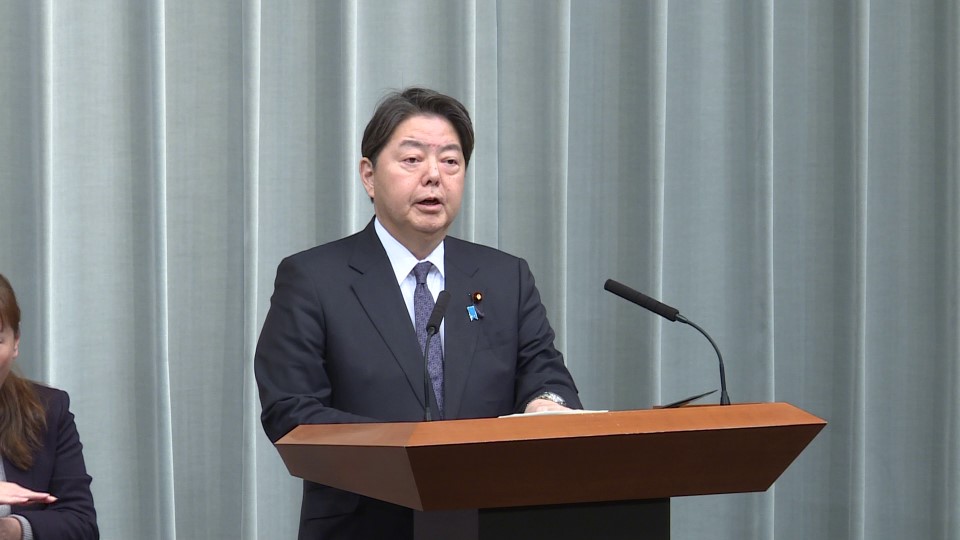
Hayashi left the cabinet in the September 2023 reshuffle and became subcommittee chairman of the LDP Tax Commission. However, in December 2023, he returned to the cabinet as Chief Cabinet Secretary after the resignation of Hirokazu Matsuno, who stepped down due to a political funding scandal involving LDP factions.
In this role, he is responsible for managing the cabinet's daily operations, coordinating policies among ministries, and acting as the government's chief spokesperson. Following the 2024 LDP leadership election, where he placed fourth, the new Prime Minister Shigeru Ishiba retained Hayashi as Chief Cabinet Secretary in his cabinet, which was formed on 1 October 2024. He was re-elected to the House of Representatives in the 50th general election on 31 October 2024, and subsequently retained his position as Chief Cabinet Secretary in the Second Ishiba Cabinet formed on 11 November 2024.
5. Member of the House of Representatives
5.1. Transition to the House of Representatives
On 15 July 2021, Hayashi held a press conference to announce his intention to resign from the House of Councillors and run as a candidate for the House of Representatives in the general election scheduled for later that year. He formally resigned from the House of Councillors on 16 August 2021.
His decision to switch to the Lower House meant a direct confrontation with Takeo Kawamura, the then-incumbent LDP representative for the Yamaguchi 3rd district. Kawamura was initially expected to remain the official LDP candidate with the backing of his faction leader, Toshihiro Nikai. However, the situation changed significantly when Fumio Kishida, a member of the same Kōchikai faction as Hayashi and sharing similar political views, won the 2021 LDP presidential election on 29 September and became prime minister.
Following Kishida's victory, the LDP's Yamaguchi Local Committee recommended Hayashi as the official candidate for the 3rd district. After being shown secret survey results by LDP Secretary-General Akira Amari indicating that Hayashi was more than twice as popular as Kawamura in the constituency, Kawamura decided not to stand in the election. As the official LDP candidate, Hayashi secured a landslide victory in the 2021 general election, winning 77% of the votes, and became a member of the House of Representatives.
6. Liberal Democratic Party leadership campaigns
6.1. 2012 LDP leadership election
In September 2012, Hayashi announced his candidacy for the 2012 Liberal Democratic Party (Japan) presidential election. This was a historic moment, as he became the first member of the House of Councillors to run for the LDP presidency since the introduction of the endorsement system in 1972. Despite some internal party support from junior and mid-level members, he faced resistance, with one MP reportedly telling him that "The prime minister should belong to the Lower House because an Upper House premier does not risk his seat when calling an election." In the first round of voting, Hayashi secured 27 votes, placing him last among the five candidates. The election was ultimately won by Shinzo Abe, who led the LDP back to power in the subsequent general election.
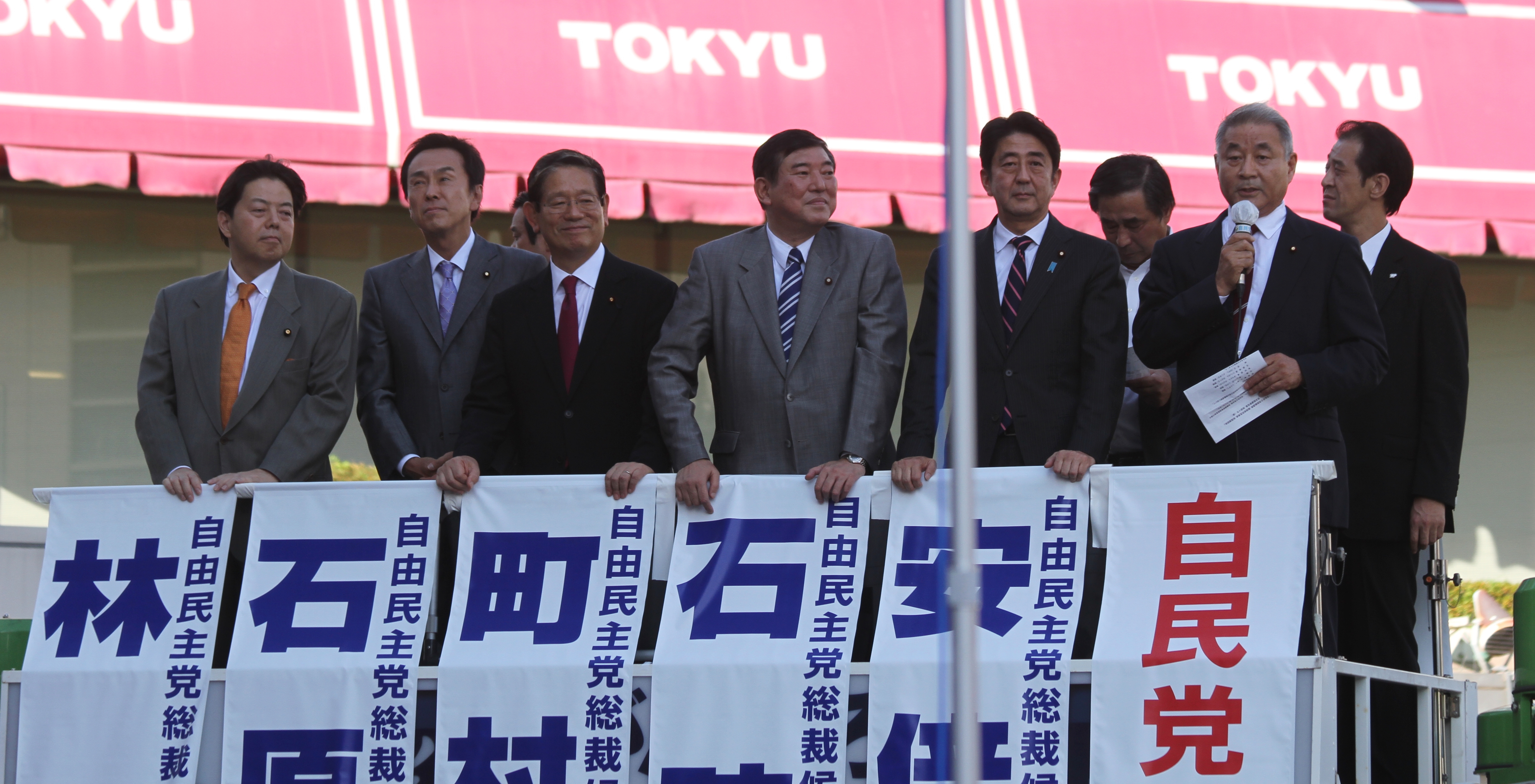
6.2. 2024 LDP leadership election
Hayashi made his second bid for the LDP leadership in the 2024 Liberal Democratic Party (Japan) presidential election, formally announcing his candidacy on 3 September 2024. In his campaign speech, he emphasized a "politics of 'Jin' (仁) that is kind to people," stressing compassion and empathy, and pledged to "restore politics that can gain the public's sympathy." His platform aimed to address public trust issues following recent political funding scandals. In the election held on 27 September 2024, Hayashi placed fourth among nine candidates, securing a notable number of votes, which was seen as a positive evaluation of his policy expertise. Despite not winning the leadership, the newly elected Prime Minister Shigeru Ishiba retained Hayashi as Chief Cabinet Secretary in his cabinet, demonstrating continued confidence in his abilities.
7. Policy and stances
7.1. Foreign policy and security
Hayashi's foreign policy and security stances reflect a pragmatic approach, balancing traditional alliances with regional engagement. He has expressed a nuanced view on the constitutional amendment to explicitly mention the Self-Defense Forces, indicating a general agreement with the idea.
Regarding North Korea, Hayashi has shown a willingness to provide assistance, stating that Japan "cannot afford to ignore" the expansion of COVID-19 in the country, despite the absence of diplomatic relations. This suggests a humanitarian approach to regional crises.
On China, while some have labeled him "pro-China" due to his past role as chairman of the Japan-China Friendship Parliamentarians' Union, Hayashi identifies himself as a "know-China" faction member. He argues that it is acceptable to be a "know-China" figure, similar to how there are "know-Japan" figures in the United States, but stressed that one "must not be subservient to China." Upon becoming Foreign Minister in November 2021, he resigned from the chairmanship of the Japan-China Friendship Parliamentarians' Union to avoid any "unnecessary misunderstandings" in his official duties. In May 2019, as chairman of the union, he had stated that the past year had been "epoch-making" for Japan-China relations, describing the current situation as "beautiful and harmonious like the Reiwa era."
In relations with South Korea, Hayashi has emphasized the need for early improvement, especially given the challenging regional situation. During a meeting with South Korean Foreign Minister Park Jin in May 2022, he gifted a harmonica, which Park interpreted as a symbol that "Japan-Korea relations will play a harmony." They agreed to accelerate discussions on improving future-oriented relations and addressing pending issues such as the forced labor issue.
7.2. Economic and fiscal policy
Hayashi's economic and fiscal policies generally align with a conservative approach, prioritizing fiscal discipline and economic growth through specific industrial strategies. He has consistently supported increases in the consumption tax, stating in 2013 that the raise to 8% should proceed as planned, and in 2019 that the raise to 10% should be implemented "in accordance with the law."
He advocates for fiscal consolidation, emphasizing the necessity of achieving a primary balance surplus and maintaining a consistent stance on fiscal soundness. He has expressed skepticism about theories like Sims' theory, which suggests that inflation from aggressive fiscal spending could reduce real government debt, calling such ideas "dubious" and "unrealistic."
Hayashi believes that the key to revitalizing the Japanese economy lies in "monozukuri" (craftsmanship/manufacturing) and fostering an environment conducive to the establishment of startup companies. He argues that promoting entrepreneurship will help regain economic momentum. He has also expressed a desire to present a "grand framework" for Japan in the Reiwa era, akin to Prime Minister Hayato Ikeda's Income Doubling Plan. In 2015, he explored legislative initiatives to give the Diet its own research function for economic and fiscal matters, aiming to invigorate parliamentary debate on fiscal reconstruction. In 2021, he became a co-initiator of a bipartisan parliamentary group seeking to establish an independent oversight body to monitor government spending.
Regarding decarbonization, Hayashi supports the continued reliance on nuclear power as a necessary measure to achieve carbon neutrality.
7.3. Social policy
Hayashi's positions on social issues reflect a generally conservative stance, though with some flexibility. On the issue of selective divorce (spousal surname), he has stated that he "cannot say either way," indicating a cautious or undecided position. He has expressed some opposition to explicitly legalizing same-sex marriage in law. However, in December 2016, he voted in favor of the Act on the Promotion of Resolution of Discrimination against Buraku, a law aimed at resolving discrimination against the Burakumin community, demonstrating support for addressing historical social injustices.
8. Personal life
8.1. Hobbies and interests
Yoshimasa Hayashi has a range of hobbies and interests, particularly in music. He enjoys playing musical instruments, including the guitar, keyboard, and piano, and has also played the violin and bass since childhood. He is known for composing music. Hayashi is a member of a band called Gi!nz (ギインズGi!nzJapanese) with fellow LDP colleagues, including Yasukazu Hamada, Hachiro Okonogi, and Masashi Matsuyama, and they have performed live. During his tenure as Foreign Minister, he gained attention for his "piano diplomacy," performing impromptu piano pieces at international gatherings, such as "Imagine" at a G7 Foreign Ministers' Meeting dinner. He also enjoys karaoke and golf. In 2016, he performed a piano rendition of The Beatles' "Let It Be" on a television program.
8.2. Family
Hayashi is married to Yuko Hayashi, who also attended the University of Tokyo and graduated in 1988. She is currently a specially appointed professor at the Graduate School of Management of Technology at Yamaguchi University. They have two daughters, the elder born in 1994.
9. Family and relatives
9.1. Family tree and notable relatives
The Hayashi family, known by the trade name "Ohtsuya," has a long and distinguished history in Shimonoseki, Yamaguchi Prefecture, dating back to 1717. They traditionally operated a soy sauce brewing business. The family also has significant involvement in local industries, including the management of Sanden Kotsu, a bus operator, and Yamaguchi Godo Gas, a general gas utility company, both headquartered in Shimonoseki. The founder, Heijiro, moved to Akamagaseki (present-day Shimonoseki) during the Tenmei era (1781-1789), accumulating wealth through rice and pawn businesses before adopting the Hayashi surname in the early Meiji period with the establishment of the family registration system.
Notable members of the Hayashi family and their relatives include:
- Great-great-grandfather:** Hayashi Heishiro (林平四郎), the 4th head of the Hayashi family. He was a wealthy businessman who operated Ohtsuya, Shunpanro (a famous restaurant), and engaged in soy sauce brewing and innkeeping. He served as a member of the House of Representatives and the House of Peers. He passed away in 1941 and was posthumously awarded the Junior Fifth Rank.
- Great-grandfather:** Hayashi Chogoro (林長五郎), the eldest son of Hayashi Heishiro.
- Grandfather:** Hayashi Keisuke (林佳介), a businessman and member of the House of Representatives (Japan Progressive Party).
- Father:** Yoshiro Hayashi (林義郎), a prominent politician who served as a member of the House of Representatives for the Liberal Democratic Party. He held cabinet positions as Minister of Health and Welfare (First Nakasone Cabinet) and Minister of Finance (Miyazawa Reshuffled Cabinet).
- Mother:** Hayashi Mariko (林万里子), whose grandfather was Akira Tawarada (俵田明), the founder of Ube Industries. Her father, Hiroo Tawarada, served as Vice President of Ube Industries. Hiroo Tawarada was the second son of Saikichi Soku, a director at Mitsui Mining, and became an adopted son-in-law of Akira Tawarada.
- Paternal Uncle:** Hayashi Kosuke (林孝介), former Chairman of Sanden Kotsu, advisor to Sanyo Driving School, and Chairman of the Yamaguchi Prefectural Bus Association. He was also the former representative director and president of Ohtsuya.
- Cousin:** Hayashi Shunsaku (林俊作), the eldest son of Hayashi Kosuke. He is the current representative director and president of Ohtsuya and chairman of the Yamaguchi Prefectural PTA Federation.
- Sister:** Reiko Hayashi (林玲子), Deputy Director-General of the National Institute of Population and Social Security Research.
- Brother:** Hayashi Tetsuro (林哲郎), who works at Mitsui & Co.
- Wife:** Yuko Hayashi (林裕子), a specially appointed professor at the Graduate School of Management of Technology at Yamaguchi University.
- Daughters:** Atsuko (温子), born in 1994, and a younger daughter.
- Grandfather (by marriage):** Hiroo Tawarada (俵田寛夫), Vice President of Ube Industries.
- Uncle-in-law:** Katsusada Hirose (広瀬勝貞), former Governor of Oita Prefecture.
- Relative:** Michisada Hirose (広瀬道貞), advisor to TV Asahi Corporation and former chairman of the National Association of Commercial Broadcasters in Japan.
- Relative:** Sadao Hirose (広瀬貞雄), former representative director and president of Fuji Spinning Co., Ltd.
- Cousin:** Ken Hirose (広瀬建), a member of the House of Representatives.
10. Controversies and criticisms
10.1. Pension non-payment and political funding issues
In 2004, during a period of public scrutiny over politicians' pension non-payment records, it was revealed that Hayashi had an unpaid pension record.
Further controversies arose in 2015 regarding political funding. It was reported in March 2015 that Hayashi had received a total of 600.00 K JPY in donations from companies that had received government subsidies, raising questions about ethical conduct. Additionally, the newspaper Akahata reported that two companies, sharing the same address and owned by the same individual in Yamaguchi Prefecture, had purchased a total of 2.00 M JPY in party tickets in October 2013. This raised suspicions of a violation of Article 22-8 of the Political Funds Control Act, which prohibits receiving more than 1.50 M JPY from the same entity for political party tickets, suggesting an attempt to circumvent the limit by splitting the purchase between two entities.
Furthermore, it was reported that Hayashi's political funding organization had spent "dining expenses" at a hostess club in Akasaka while he was serving as Minister of Agriculture, Forestry and Fisheries.
10.2. Diplomatic controversies
Hayashi faced criticism for his handling of diplomatic interactions. In March 2022, it was revealed during a Diet committee meeting that a request for a meeting from the Ukrainian Ambassador to Japan, Sergiy Korsunsky, had gone unfulfilled for approximately one month amidst the escalating crisis in Ukraine. Hayashi initially stated he was unaware of the request, leading to accusations that the Ministry of Foreign Affairs had unilaterally blocked the meeting. He subsequently met with the ambassador later that day. The ambassador later posted on X (formerly Twitter) that it was a vice minister, not Hayashi, who had been reluctant to meet, though the post was later deleted.
In July 2022, during a press conference, when asked about Taiwan's Vice President Lai Ching-te's visit to Japan for former Prime Minister Shinzo Abe's funeral, Hayashi referred to him as "the person you mentioned." This phrasing drew strong protests from the All Japan Taiwan Union, which deemed it "extremely impolite" and detrimental to Japan's national interests. Hayashi explained that he used the phrase "the person you mentioned" simply in response to the reporter's question, which had already named the individual. However, critics, including some journalists and commentators, argued that this choice of words was an undue deference to the Chinese government, which considers Taiwan a breakaway province and objects to any official recognition of Taiwanese leaders.
10.3. Other controversies
In April 2018, it was reported that Hayashi, then Minister of Education, Culture, Sports, Science and Technology, had used his official vehicle to visit a yoga studio in Tokyo. The report stated that he visited the studio in the afternoon and had the official car wait for him for two hours. Government officials acknowledged the use of the official vehicle but stated that it did not violate operational rules if it occurred between official duties.
In December 2021, the Yamaguchi Prefectural Police referred the Yamaguchi Vice Governor and two Yamaguchi City officials to prosecutors on suspicion of violating the Public Offices Election Act. They were accused of distributing application forms for Hayashi's support group to public employees through multiple prefectural executives and having them fill in their names, constituting illegal use of public office for election activities. The Yamaguchi Summary Court subsequently issued summary orders, including a 300.00 K JPY fine for the vice governor, which was paid immediately.
Hayashi initially stated in August 2022 that he had "no relationship" with the Unification Church (officially the Family Federation for World Peace and Unification). However, he later clarified that he had received an interview from an organization deeply connected to the Unification Church in 2012, for which he apologized, stating he was unaware of the connection at the time. He pledged to have no further relations with the group. In February 2024, he further disclosed that he had met with a Unification Church-related individual in September 2021, a meeting arranged by a local political associate. He stated that it was one of many meetings, and he could not recall the details of the person or the conversation, reiterating that he had not received any support or donations from the group.
11. Electoral history
Yoshimasa Hayashi has a consistent record of electoral victories in both the House of Councillors and the House of Representatives.
- 1995 House of Councillors Election (17th)**: Elected for Yamaguchi at-large district.
- Party: Liberal Democratic Party
- Votes: 287,099
- Vote Share: 46.03%
- Rank: 1st (out of 4 candidates)
- Outcome: Elected
- 2001 House of Councillors Election (19th)**: Re-elected for Yamaguchi at-large district.
- Party: Liberal Democratic Party
- Votes: 428,122
- Vote Share: 61.39%
- Rank: 1st (out of 5 candidates)
- Outcome: Elected
- 2007 House of Councillors Election (21st)**: Re-elected for Yamaguchi at-large district.
- Party: Liberal Democratic Party
- Votes: 419,947
- Vote Share: 56.73%
- Rank: 1st (out of 3 candidates)
- Outcome: Elected
- 2013 House of Councillors Election (23rd)**: Re-elected for Yamaguchi at-large district.
- Party: Liberal Democratic Party
- Votes: 455,546
- Vote Share: 79.36%
- Rank: 1st (out of 3 candidates)
- Outcome: Elected
- 2019 House of Councillors Election (25th)**: Re-elected for Yamaguchi at-large district.
- Party: Liberal Democratic Party
- Votes: 374,686
- Vote Share: 69.97%
- Rank: 1st (out of 4 candidates)
- Outcome: Elected
- 2021 House of Representatives Election (49th)**: Elected for Yamaguchi 3rd district.
- Party: Liberal Democratic Party
- Votes: 96,983
- Vote Share: 76.94%
- Rank: 1st (out of 2 candidates)
- Outcome: Elected
- 2024 House of Representatives Election (50th)**: Re-elected for Yamaguchi 3rd district.
- Party: Liberal Democratic Party
- Votes: 115,687
- Vote Share: 69.67%
- Rank: 1st (out of 3 candidates)
- Outcome: Elected
12. Honors and awards
Hayashi has received several national and international honors throughout his career:

**Order of Merit, 3rd Class** (Ukraine): Awarded on 23 August 2022.

55x55px **National Order of Merit, Grand Cross Extraordinary** (Paraguay): Awarded in 2023.
13. Affiliations and parliamentary groups
Yoshimasa Hayashi is a member of various parliamentary groups, political organizations, and associations, reflecting his diverse interests and policy engagements:
- Bipartisan Parliamentary Group for Considering an Independent Fiscal Estimation Agency (Co-initiator)
- Parliamentary Federation of the Food and Agriculture Organization (Chairman)
- Liberal Democratic Party Tobacco Parliamentarians' League
- Shinto Political League National Diet Members' Caucus
- Parliamentary Group for Visiting Yasukuni Shrine Together
- Parliamentarians' Association for Supporting the Beijing Olympics (Secretary)
- Parliamentarians' Association for Japan-Korea Communication (Secretary)
- Japan-China Friendship Parliamentarians' Union (Former Chairman)
- Urasenke Tea Ceremony Shimonoseki Branch (Branch Manager)
- Yamaguchi Prefectural Soft Tennis Federation (Chairman)
- Prince Hirobumi Ito Commemoration Association (Chairman)
- Kameyama Hachimangu Shrine (Chief Representative)
- Yamaguchi Prefectural Bowling Federation (Chairman)
- Parliamentary League for Promoting the Prohibition of Cluster Bombs (Initiator)
- Boy Scouts Promotion Parliamentarians' League (Director)
- Parliamentary League for the Creation of an International Solidarity Tax
- Gi!nz (band)
- Parliamentary League for Establishing Small Business Tax System
- Content Industry Promotion Parliamentarians' League (Chairman)
- Yamaguchi Prefectural Badminton Association (Chairman)
14. Supporters
Key groups and organizations that have supported Yoshimasa Hayashi's political campaigns and policy initiatives include:
- National Tobacco Retailers Political Federation (organizationally recommended candidate)
- Shinto Political League
15. Publications
Hayashi has co-authored a book and contributed to academic research:
- The Work of a Diet Member - Politics as a Profession (国会議員の仕事 - 職業としての政治), co-authored with Keisuke Tsumura, Chuko Shinsho, 2011.
- He has also published various academic papers and research, which are indexed in CiNii.